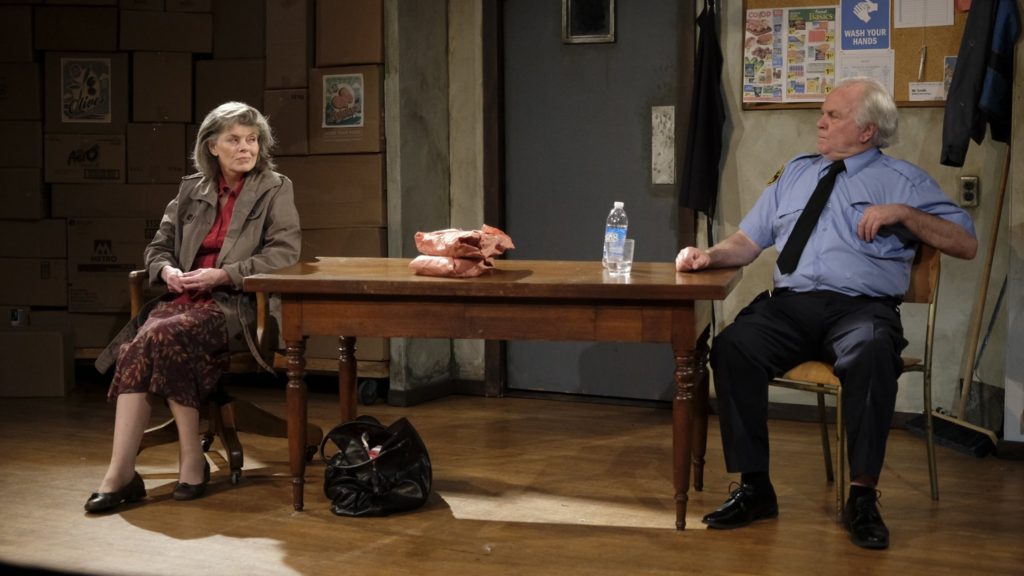
Morris Panych’s The Shoplifters is a dark comedy that inspires laughter and contemplation and, although it premiered at Arena Stage in Washington DC in 2014, its themes of income inequality and the continued Corporatization of our communities and society as a whole seems even more relevant today. Theatre Baddeck brings this play to life until August 18th, 2019.
The Shoplifters is a modern Robin Hood story, with a twist. Alma (Mauralea Austin) and Phyllis (Hannah Ziss) have been picked up by security guards at the local grocery store, Otto (Lee J. Campbell) and Dom (Logan Robins). They are accused of trying to steal two large steaks. Otto has been working as the store’s security guard for a long time, but is on his way out. His replacement, Dom, is still in training. Otto’s views on being a security guard reflect his sense of morality: that it is wrong to steal, of course, but that those who do so, often have compelling reasons and that everyone in the store should be treated like a human being. Dom is young and overzealous, he is attracted to jobs in law enforcement because of his religious views, which encourage judgement and punishment and a narrow interpretation of the commandment “Thou Shalt Not Steal.” Phyllis is also young and isn’t an experienced shoplifter. Alma, on the other hand, has been playing this game for years. Panych explores Alma’s motivations for stealing and Otto’s motivations for being lenient while setting them up against Dom, the play’s most absurd character, who also somehow represents some of our society’s most prevailing attitudes. In a series of dramatic and hilarious hijinks Panych creates a unexpected scenario that allows the play the wrap up tidily at the end, but whether the ending is happy or not depends on whether you’re on Alma or Dom’s side.
Ziss gives a sweet performance as Phyllis, a free-spirited, paranoid young girl with a good heart, who has fallen on hard times, but is also certain that hard work at her job at the coat check will eventually pay off for her. Robins does a wonderful job at bringing Dom to hilarious and frustrating life. He captures the arrogance that those who see without nuance often have, and he also does a great job at showing the changing power dynamics, between how Dom takes advantage of his position with a young, vulnerable woman, but defers continually to an older white man. Dom also has an eye that constantly twitches and a dark past that informs the audience about why he has made these misguided choices. In this way, Panych has simultaneously set Dom up to seem ridiculous, but also encourages us to see him not as an isolated incident, but as part of a pattern of abuse. Lee J. Campbell gives great nuance to Otto, who is much more of a “socialist” (or at least a humanist) than Dom, but also has a moment where he takes advantage of the power discrepancy between himself and Alma, suggesting that old adage “power corrupts,” and that it can infiltrate even well-meaning, decent people if they get frustrated enough. Campbell builds to this moment so genuinely and with such realism, you forget he’s acting. His chemistry with Mauralea Austin’s Alma is spectacular. It’s a gift to watch these two Nova Scotian powerhouses play characters that are simultaneously so at odds with one another, and yet also entirely captivated by the other. Austin’s Alma is fierce and biting, she is full of common sense and the everyday struggles of the working class, she has wit and heart and slyness, and she is also tired of having to work so hard for so little. She is a hero is the most unexpected ways, but like Robin Hood, in a way that is sadly fitting for the world that she lives in.
Heidi Malazdrewich directs the play, making the most of the venue’s small stage, which gives us a great sense of the crowded quarters our characters are in in the backroom of a grocery store. This is especially hilarious during the physical comedy scenes where Alma and Phyllis attempt their escapes.
The most interesting question that The Shoplifters raised for me was: who decides what is “appropriate” for those who live in poverty to have? Or rather, why should anyone judge what is “appropriate” for those who live in poverty to have? Food and water are human rights, but why is peanut butter considered essential, but a steak to celebrate someone’s birthday is considered an extravagance reserved only for someone of higher means? Panych reminds us in this play about how the wealthiest people in the world have created a society where the middle and lower middle classes ally themselves with the 1% to help police the poorest folks, instead of actively working for a fairer redistribution of wealth and resources, which would actually be in their best interest. He does so in his characteristic style of absurdity, hilarity and smarts. If you’re in the mood to have a laugh and a think this summer and you want to see Lee J. Campbell and Mauralea Austin at their very best, head to Baddeck and catch this show!
He’d Be Your Mother’s Father’s Cousin plays on select days at Theatre Baddeck (24 Queen Street, Baddeck) on select days through August 18th, 2019. Tickets range in price from $18.00-$28.00 (plus tax). For tickets please call 902.412.7122 or visit this website.
You can find Theatre Baddeck on Social Media: Facebook. Twitter. Instagram (@theatrebaddeck).






